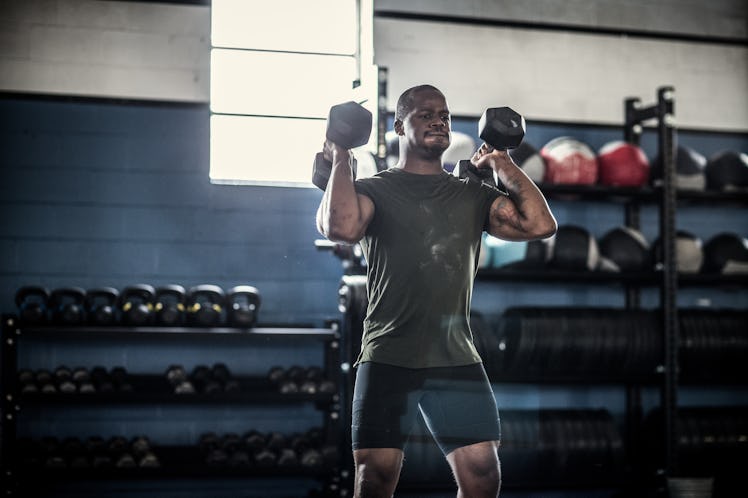Should You Do Cardio Before Or After Weights?
It depends on what your fitness goals are.

People exercise to reach a wide variety of goals, and different goals require different workouts and amounts of cardio and strength training. What exercises make up those workouts is, of course, extremely important. But so is the order in which you do them. So whether your fitness goal is to lose weight, build strength, or train for endurance, the big question is: should you do cardio before or after weights?
Keith Baar, Ph.D., a professor of molecular exercise physiology at the University of California, Davis, says that for most people who workout 3-4 times weekly for fitness, whether you do cardio or strength training first isn’t so important as long as you make time for both types of workouts. In fact, you should do whatever is easiest for you. If you get to the gym and the weights are open but the cardio machines aren’t, do weights first. “It’s always better to do both than to do just one, no matter the order,” Baar says.
That said, the order does have some effect. So if your goal is to maximize your workout and do the absolute most to achieve your particular fitness goals, here’s what you should keep in mind about whether you should do weights or cardio first.
What’s Better: Cardio Or Weights First?
If you’re training for an endurance event like a marathon or a triathlon, lifting weights after your cardio can help keep your muscles from stiffening and reduce your risk of injury. So go ahead and focus on your endurance training by running, biking, or whatever other form of cardio first and schedule your strength training for the end of your workout.
But if you’re trying to gain bulk through strength training, doing weights first is best. You should also avoid too much endurance exercise in general because excessive cardio has been shown to reduce muscle mass in elite lifters, says Baar. For instance, an April 2015 study published in the Journal of Strength and Conditioning found that “strength performance decreased when preceded by high-intensity intermittent running or cycling exercise.”
If weight loss is your goal, doing weights before cardio burns more fat, according to a 2007 study published the journal Medicine & Science in Sports & Exercise. And although cardio is great for burning calories, strength training is crucial for weight loss because building muscle increases your metabolism even when you’re at rest, Baar says. Not to mention that strength training while losing weight keeps you from wasting away. “When you lose weight, 25% of it is muscle,” says Karen Owoc, a clinical exercise physiologist and founder of AgeStrong. To combat that, you need to continue to add and build muscle while you’re losing weight.
You can also separate your cardio and strength training into different days of the week, or combine them into circuit training or high-intensity interval training. According to a study published in the British Journal of Sports Medicine, “12 weeks of high-intensity interval training (HIIT) improves cardio-metabolic risk factors such as waist circumference, percentage body fat, resting heart rate, systolic blood pressure and diastolic blood pressure in overweight/obese populations.” If those findings align with your goals, then consider HIIT. Researchers saw results in people doing the workouts just 3-4 times weekly.
Strength Training For Longevity
Our knowledge of cardio versus strength training has changed significantly over the past two decades. We used to think that cardio was everything, says Owoc, often underestimating the importance of weights and strength training.
But now we know better. Both Baar and Owoc agree that strength training should be front and center and a regular part of your workout, no matter whether you do it before or after cardio, as it’s been shown to increase longevity. A 2022 review of 16 studies published in the British Journal of Sports Medicine found that just 30 to 60 minutes a week of muscle-strengthening or resistance training increased life expectancy by 10% to 17%.
When you do strength training during your workout, however, depends on what you’re trying to accomplish. Ultimately, Owoc says, “It’s important to know what your goal is before hitting the gym.”